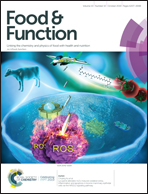Coumarin alleviates ovalbumin-induced food anaphylaxis in a mouse model by affecting mast cell function
Abstract
Coumarin is an important organic heterocyclic compound with a wide range of sources in nature. It plays an important role in the drug discovery process due to its existence in diverse biologically active compounds and its broad bioactivity. In this study, the anti-allergic activity of coumarin was evaluated using an ovalbumin (OVA)-induced mouse food allergy model and an immunoglobulin (Ig)E mediated mouse bone marrow-derived mast cell (BMMC) model. Coumarin could alleviate the OVA-induced allergic symptoms, decrease the diarrhea rates, and promote the rectal temperature rise in allergic mice. Moreover, coumarin had the ability to reduce the levels of histamine and mouse mast cell proteinases, inhibit OVA-specific IgE, and significantly decrease the population of mast cells in the spleen and mesenteric lymph nodes. Coumarin could also significantly suppress mast cell-dependent passive cutaneous anaphylaxis. Additionally, the number of mature BMMCs was decreased as coumarin caused the suppression of c-KIT receptors. Furthermore, coumarin up-regulated the apoptosis of OVA-activated BMMCs in a concentration-dependent manner. In conclusion, coumarin displayed effective anti-food allergy activity via the regulation of mast cell function and numbers. Coumarin and its derivatives provide a new direction for the development of anti-food allergic drug components.



 Please wait while we load your content...
Please wait while we load your content...